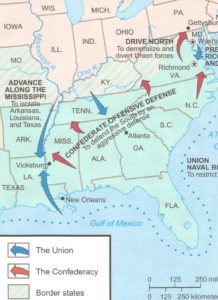The 1861 Confederate Strategy
In 1861, the Confederate government’s goal was to maintain its independence. And, once their military forces in Charleston, South Carolina were ordered to fire on Fort Sumter, they, in effect, declared their intention to use armed force to obtain that goal.
Upon the loss of Fort Sumter, the President of the United States asked for 75,000 volunteer troops in order to force the states in secession back into the Union. A war was thus initiated between the two governments. How did the Confederate government intend to win that conflict and thus achieve their goal of independence?
Jefferson Davis decided the best strategy was to adopt a defensive posture. This was called a ‘cordon defense’ and it involved defending all the borders of the new nation while not taking offensive action against the North. The Confederate victory at Bull Run in July 1861 left the Federal capital of Washington City virtually undefended. But, Davis resisted the advice of his victorious Bull Run general, P.T. Beauregard and refused permission to advance against the undefended Federal capital.
Almost immediately, Davis ordered the Barrier Islands of South Carolina and Georgia to be abandoned because it was decided they could not be successfully defended.

To the north, the Confederate claim that the Ohio river was their northern-most border was successfully challenged by Federal forces. The western CSA command, under Confederate General Albert Sidney Johnston had his command headquarters in Bowling Green, Kentucky Early in 1862 however, the loss of Fort Donelson, TE to Grant and his Union troops, forced General Johnston to withdraw entirely from Kentucky. Thus, that state was lost to the Confederacy as was an entire army of between 15,,000 and 18,000 men captured at Fort Donelson.
The loss of Fort Donelson had other consequences, too. Nashville, Tennessee, the capital of that state was also lost to the South. The dominating fort at Columbia, Kentucky had to be abandoned to the Federals, too. Thus, the defensive line had to be moved considerably south of the Ohio River.
The federal strategy of re-capturing control of the Mississippi River was being successfully carried out on the lower Mississippi, too when admiral Farragut captured New Orleans in April of 1862. He then followed this by taking by Baton Rouge and Natchez that same spring. Memphis on the northern Mississippi River would soon follow. When Vicksburg fell in July of 1863, the Confederacy was split in two and the ‘cordon defense’ strategy was in shambles.
By then, the only hope for the Confederate government to achieve their independence was for Lincoln to loose the November election of 1864 to the nominee of the Democrat Party. That party’s platform promised to end the war by negotiating a peace with the Confederate government.


 A Great Read! I couldn’t put this book down once I got started. The detail was great and I really like the main character, Michael. Knowing that so much research went into this book made it exciting to read!
A Great Read! I couldn’t put this book down once I got started. The detail was great and I really like the main character, Michael. Knowing that so much research went into this book made it exciting to read!